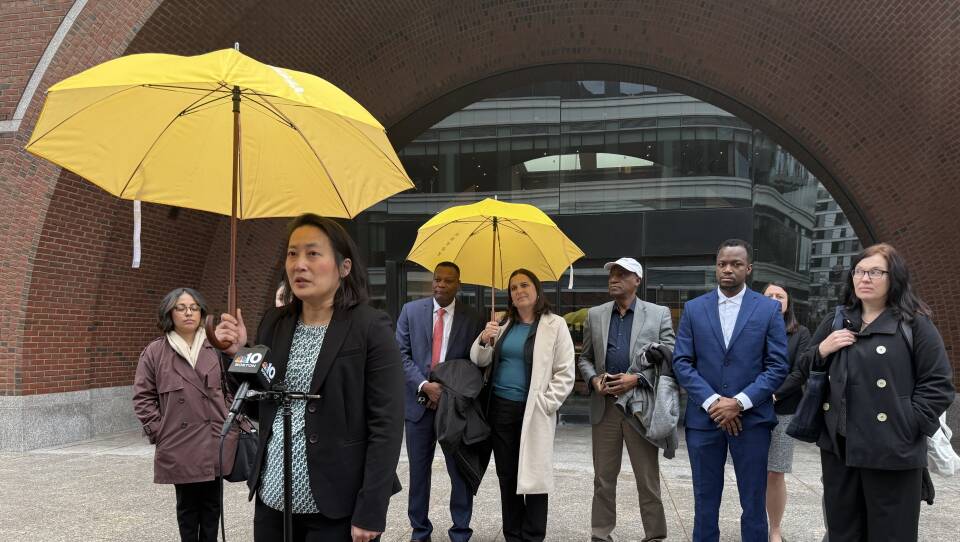Attorneys for a number of parolees suing the government for their programs’ pause and termination sparred with an attorney from the U.S. Department of Justice on Monday.
If policies under President Donald Trump stay in place, half a million people across the United States who came from Cuba, Haiti, Nicaragua and Venezuela will lose their legal status in three weeks’ time.
Attorneys representing several humanitarian parolees from those countries — as well as parolees from Ukraine who fled the conflict with Russia, Afghan interpreters who aided the U.S. military during the war, and others — are arguing the Trump administration overstepped its authority in terminating these programs designed for people fleeing dangerous conditions in their home countries.
District of Massachusetts Judge Indira Talwani could issue a wide-ranging preliminary injunction to pause the Trump administration’s attempts to strip legal status from hundreds of thousands of humanitarian parolees.
But first, Talwani has to decide how broad such an injunction could be. In the case’s first hearing Monday, attorneys representing the Trump administration argued that Talwani’s power in this case isn’t so broad and that, at most, she could halt the legal status changes for the over 20 individual plaintiffs suing in this case.
“If you were to define the ability to challenge anything in the immigration world as saying we have to weigh whether there is ultimately relief for a particular individual, then what you’ve said is the courts can have no role,” Talwani said.
The judge heard arguments on whether it is within her power to intervene in these programs’ fate, whether it is within the Trump administration’s power to terminate these programs and whether she should temporarily pause these programs’ termination while these questions are resolved.
Plaintiff attorney Justin Cox said parties were challenging the Trump administration’s order to U.S. Customs and Immigration Services to halt all pending applications for a number of parole programs.
Talwani cited the Administrative Procedures Act (APA), which creates a federal system of rules for policy changes. She said if an administration comes in and decides to ignore that, it could be problematic.
Brian Ward, an attorney defending the Trump administration’s policies, argued the act’s rules don’t apply here.
The suit was originally filed in late February. Additional plaintiffs have joined the suit in the last month, now including people on parole through a federal program named Uniting for Ukraine for Ukrainians displaced by the invasion of the country by Russia; the parole processes for nationals of Cuba, Haiti, Nicaragua, and Venezuela; Operation Allies Welcome for Afghans fleeing the newly resurgent Taliban; Central American Minors; a family reunification program; and others.
Plaintiffs come from Massachusetts, New York, Georgia, Nebraska, Wisconsin, California and elsewhere.
A series of Trump administration actions starting the day of the inauguration paused and terminated parole programs — questioning the legality of their creation and expansion under the Biden administration — and halted immigration benefits accessed by people in the country under those programs, like renewing work authorizations.
Ward argued that any actions taken by the judge should not cover all of the hundreds of thousands of people whose immigration status would change under these new directives.
“Granting class relief can be too broad and problematic,” Ward said.
About 75,000 Afghans were eventually brought to the United States on parole through Operation Allies Welcome and over 200,000 Ukrainians through Uniting for Ukraine. Over 500,000 people came to the United States through the program for parolees from Cuba, Haiti, Nicaragua and Venezuela.
Plaintiff attorneys and Talwani discussed another option: subdividing classes by whether the sponsors for immigrants in those programs are in the country. In some cases, like Uniting for Ukraine and the program for parolees from Cuba, Haiti, Nicaragua and Venezuela, many sponsors for parolees are U.S. citizens based in the United States.
In a press conference after the hearing, Esther Sung, legal director of Justice Action Center, one of the organizations representing plaintiffs, said she hopes that any pauses on these changes would impact hundreds of thousands of people.
“What the government here is doing for beneficiaries of parole is: it’s closing all the doors and then also closing all the windows, too, and it’s giving them no options,” Sung said.
One Massachusetts-based plaintiff, Svitlana Doe, fled her hometown in Ukraine in November 2024 with her husband and young son who suffers from celiac disease using the Uniting for Ukraine program. Court documents show she applied for an additional immigration status called Temporary Protected Status in February, but it’s “indefinitely stalled” due to the Trump administration’s changes.
Another plaintiff, Omar Doe, served alongside the U.S. military in Afghanistan for more than 18 years before being evacuated by the military following the country’s fall to the Taliban.
There was a question of whether Talwani should stay any order for a preliminary injunction for seven days to give the government time for an emergency appeal.
Plaintiffs argue that, as more time that passes, there’s a greater risk of people falling out of status, and being detained, deported, or led to believe they could be. Talwani said she had to “balance” the equities of a stay, and consider that people are permanently losing rights and status for every day a decision is delayed.
She repeatedly pointed to court documents that note an email mistakenly sent out to Ukrainians and people from other countries, telling them they must leave the country within a week or risk being found. She said it is possible that “the fact that it went out is a violation of the APA [Administrative Procedures Act].”
The message sparked fear among immigrants nationwide.
“I do think it’s a horrific thing for someone to receive those emails,” she said.
A second day of argument is set for Thursday specifically for the Cuba, Haiti, Nicaragua and Venezuela parole program.
Plaintiffs are seeking a ruling in the next three weeks, before parolees from those countries fall out of status.





